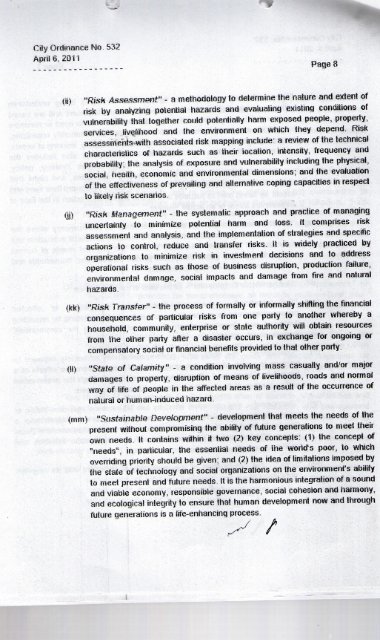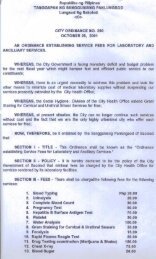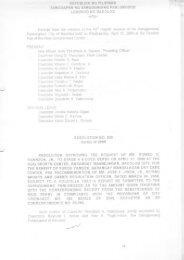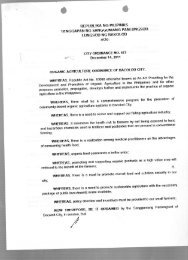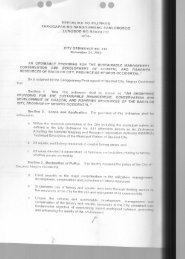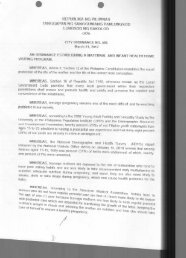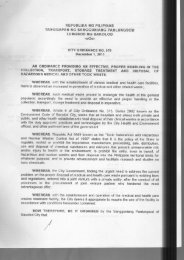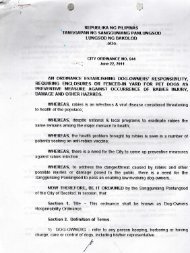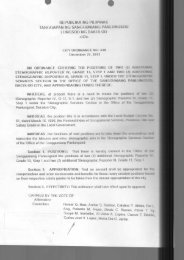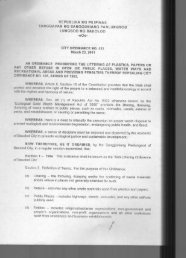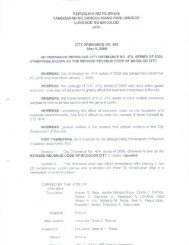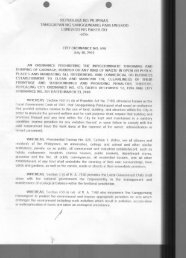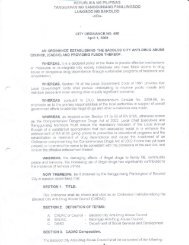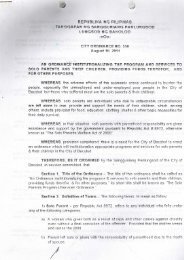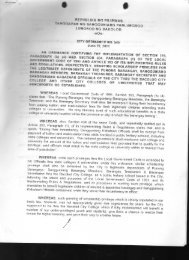City Ordinance No. 532 - Bacolod City
City Ordinance No. 532 - Bacolod City
City Ordinance No. 532 - Bacolod City
You also want an ePaper? Increase the reach of your titles
YUMPU automatically turns print PDFs into web optimized ePapers that Google loves.
<strong>City</strong> <strong>Ordinance</strong> <strong>No</strong> <strong>532</strong><br />
April 6, 2011<br />
Page 8<br />
(ii) "Risk Assessment" - a methodology to determine the nature and extent of<br />
risk by analyzing potential hazards and evaluating existing conditions of<br />
vulnerability that together could potentially harm exposed people, property,<br />
services, livelihood and the environment on which they depend. Risk<br />
assessments with associated risk mapping include a review of the technical<br />
characteristics of hazards such as their location, intensity, freguency and<br />
probability; the analysis of exposure and vulnerability including the physical,<br />
social, health, economic and environmental dimensions; and the evaluation<br />
of the effectiveness of prevailing and alternative coping capacities in respect<br />
to likely risk scenarios.<br />
(jj) "Risk Management" - the systematic approach and practice of managing<br />
uncertainty to minimize potential harm and loss. It comprises risk<br />
assessment and analysis, and the implementation of strategies and specific<br />
actions to control, reduce and transfer risks. It is widely practiced by<br />
organizations to minimize risk in investment decisions and to address<br />
operational risks such as those of business disruption, production failure,<br />
environmental damage, social impacts and damage from fire and natural<br />
hazards.<br />
(kk) "Risk Transfer" - the process of formally or informally shifting the financial<br />
consequences of particular risks from one party to another whereby a<br />
household, community, enterprise or state authority will obtain resources<br />
from the other party after a disaster occurs, in exchange for ongoing or<br />
compensatory social or financial benefits provided to that other party.<br />
(II) "State of Calamity" - a condition involving mass casualty and/or major<br />
damages to property, disruption of means of livelihoods, roads and normal<br />
way of life of people in the affected areas as a result of the occurrence of<br />
natural or human-induced hazard.<br />
(mm) "Sustainable Deveioprnent" - development that meets the needs of the<br />
present without compromising the ability of future generations to meet their<br />
own needs. It contains within it two (2) key concepts: (1) the concept of<br />
"needs'1, in particular, the essential needs of the world's poor, to which<br />
overriding priority should be given; and (2) the idea of limitations imposed by<br />
the state of technology and social organizations on the environment's ability<br />
to meet present and future needs it is the harmonious integration of a sound<br />
and viable economy, responsible governance, social cohesion and harmony,<br />
and ecological integrity to ensure that human development now and through<br />
future generations is a fife-enhancing process.


